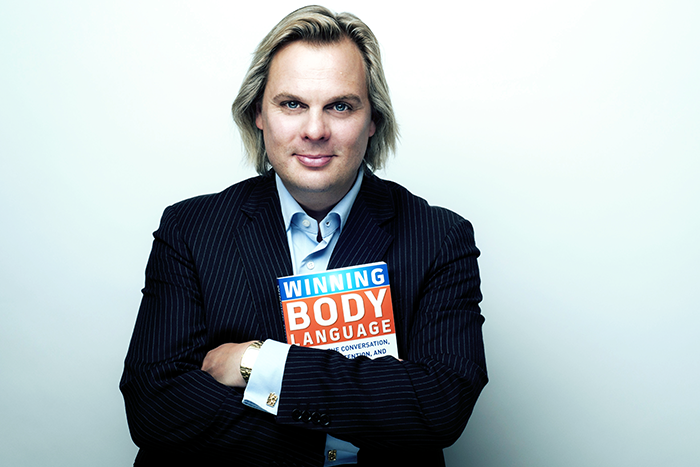Mark Bowden is a body language expert and the founder of TRUTHPLANE, a presentation training company that teaches people how to communicate with impact.
Not only has he trained Prime Ministers on nonverbal communication, but he has also written three best-selling books on body language. He has helped hundreds of people through his inspiring talks with TEDx and other organizations.
We caught up with Mark to get his tips on using body language when communicating with guests and co-workers in the hospitality industry. Spoiler: it's all about being open.

Tell us about your TRUTHPLANE training.
My expertise is in nonverbal communication and body language, and how you can use them to stand out, win trust and gain credibility. With any human interaction, there is an instantaneous moment where a person feels like they either trust you or they don't, whether you are there to really help and serve them or whether you are there for your own benefit.
The body language training I give helps in those situations, especially in hospitality where a positive feeling often comes down to the environment, and people play an incredibly important part there.
Do you think servers give off signals that make customers feel welcome or unwelcome?
Sure. A way I like to think about it is: imagine a small group warming around a fire, and one person shows up. Do we welcome them or are we unwelcoming? The first thing we can do to be welcoming is to open up space and invite them to the warmth of the fire.
Now imagine me as a fire. If my body language is open, you'll feel much warmer, but a closed body language will make you feel cold.
Think about that when guests are coming into your restaurant. Are our bodies saying we are open and warm, or are they accidentally saying we are closed and cold?
What can servers do with their body language when trying to upsell to a customer?
Well first, the smile is a universal signal. We call the full true smile the ‘Duchenne smile’, named after French psychologist Duchenne, who first worked out that everyone on the planet smiles the same way.
Your cheek muscles bunch up and pull the sides of the mouth up and the eyes narrow slightly to cause little wrinkles. If I just do half the smile, just the mouth part, my guess is that you actually don't feel that good about me.
When your brain only detects half the signal needed, it always defaults to a negative. So you will never like this person and their upsell, regardless of how good the product or service that they're selling is. You have to give your guests a full smile for more than three seconds. That is the universal signal that says: this is good, the environment is good, the relationship is good.

Left: Duchenne smile. Right: Non-Duchenne smile. Photo: Louder Than Words.
If I am upselling with a smile, I am telling you that what I am selling is good now. I also want to get eye contact. If your head is in the menu, I have to get it out of it and grab your attention. I might say something like: "have a look up here while I tell you about some of the other options for you tonight". And I make sure you see that smile as I am telling you, which should make you feel good about the upsell.
What's your advice for dealing with a hostile customer?
Rather than going for the 'fight or flight' response, I actually want to do something that feels counterintuitive, which is to be very open to the hostility. Remain calm and assertive. Have a slight smile. As you tell me what is wrong, I'll smile and nod my head, and show you that I accept what you are saying.
"The body language that you use ultimately changes your tone of voice and your mindset."
After that I can say whatever I like. I can go through scripts that I might have for dealing with these situations. What I am trying to do is show that I am open to accepting their hostility. People are not used to this, and it will confuse them. It also gives them open body language to mirror. They’ll be more likely to be open themselves. Because I want them to be open to my ideas about the situation.
I want to be nodding my head and smiling as I tell them, so they nod their heads and smile back at me and accept what I am saying. So I am going to listen, and I am going to be open, because I want them to listen and be open.
How about when you're talking to a customer on the phone? Does body language play a role there as well?
For sure it does! The body language that you use ultimately changes your tone of voice and your mindset. I'm sure we've all been on the phone to someone in hospitality and heard in their voice that they were doing something else and would rather not be on the phone with us. We’ve also had calls with people in the hospitality industry where we know they’re there for us and they’re totally engaged.
How do you create that tone of voice on purpose? Again: use your body language. I prefer for people to use headsets on the phone. That way, it leaves your arms free and you can use more of your body. You can talk to somebody in the same full-body way you would in a face-to-face interaction.
Use your body to create a voice of engagement. If you are there with a disengaged body, expect that they are going to hear it on the other side of the phone.
Are there things that staff can do to build trust with each other through their body language?
The number one thing that will build trust within your team is to look and perform like a listener. It’s one thing to listen, but do you look like a listener?
For our brains, having someone look like a listener is as good as having an actual listener. In hospitality there can be so much coming at you at one time it can be hard to listen. But if you can look like a listener your chances of actually becoming a listener increases.
"The number one thing that will build trust within your team is to look and perform like a listener. It’s one thing to listen, but do you look like a listener?"
Here’s what a listener looks like. A listener has their head tilted slightly, they have a small Duchenne smile which suggests they are with you and they’re listening. As you are talking, they tend to nod. And again, their body language will be open.
How about if a server wants to approach their manager with a problem?
Managers have a lot going on, so anyone who comes up looking like they’ve got a problem is not going to get a huge amount of quality attention. I would suggest trying not to look too much like somebody with a problem when approaching a manager.
Instead, use open body language. Let the manager know that you know their time is precious. Tell them: “I am not going to take too much of your time, I just need to tell you about one little thing quickly.” If you’ve got an open body language and smile, they’re more likely to stop and listen.
What can a manager do to make pre-shift meetings go more smoothly?
Again, it’s about open body language, a Duchenne smile and looking like a listener. Try to look like a listener rather than a commander. People are more open to commands from you as a listener when you are just an instructor.
Another thing is physical touch. A lot of research has been done around sports teams in particular. They found teams that use more arm touching, that high five more, that shake hands more and congratulate each other on a good job by just touching the shoulder, perform better.
I would suggest looking at what’s appropriate for your team and looking for ways to instigate that at a team meeting. For example, having everyone high five or shake hands before and after the meeting. High-performing teams get a lot of face-to-face time with physical interactions, so I suggest pushing the boundaries in that area.
You can catch Mark Bowden at The Alberta Hotel and Lodging Association Convention on Monday April 18th, where he will be giving the keynote address.
Visit TRUTHPLANE to learn more about Mark's communication training, or follow him on Twitter .